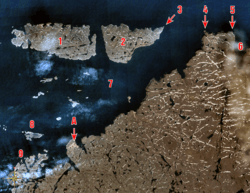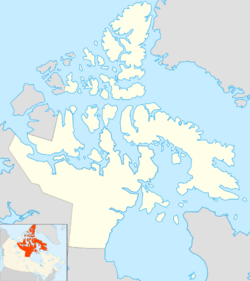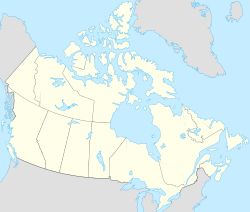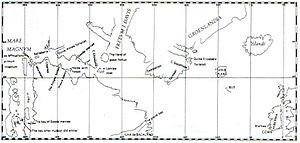Digges Islands facts for kids
|
Native name:
Saaqqayaaq-Qikirtasiit
|
|
|---|---|

Digges Islands identified by No. 1 and 2.
|
|
| Geography | |
| Location | Digges Sound, an arm of Hudson Bay |
| Coordinates | 62°34′59″N 77°49′59″W / 62.58306°N 77.83306°W |
| Archipelago | Canadian Arctic Archipelago |
| Area | 91 km2 (35 sq mi) |
| Administration | |
| Nunavut | Nunavut |
| Region | Qikiqtaaluk |
| Demographics | |
| Population | Uninhabited |
The Digges Islands (called Saaqqayaaq-Qikirtasiit by the Inuit people) are two islands in Nunavut, Canada. They are part of the Canadian Arctic Archipelago, a large group of islands in the Arctic. These islands are found in Digges Sound, which is an arm of Hudson Bay. Here, strong ocean currents from Hudson Bay meet Hudson Strait.
The small town of Ivujivik in Quebec is located south of the islands. East Digges Island is closer to the northern tip of the Ungava Peninsula than West Digges. Mansel Island is to the southwest, while Nottingham Island is to the north.
The islands have rocky cliffs. These cliffs are perfect homes for many seabirds. Large groups of thick-billed murre birds live here.
Exploring the Arctic Islands
First European Encounters
In 1610, the first recorded meeting between Europeans and the Nunavik Inuit people happened on the Digges Islands. This was during Henry Hudson's last trip to the Arctic. Hudson named many places in the Arctic after people who helped pay for his voyages. The Digges Islands were named after Dudley Digges, one of his supporters.
During these early visits, there were sometimes conflicts between the explorers and the Inuit people. In 1611, some of Hudson's crew members were killed here by Inuit. In 1612, five of Thomas Button's crew were also killed near the islands.
Later Expeditions
The area was explored again a few years later by Jens Munk. He visited the Digges Islands during his journey in 1619. These early explorations helped map out the Arctic region.
 | Madam C. J. Walker |
 | Janet Emerson Bashen |
 | Annie Turnbo Malone |
 | Maggie L. Walker |




